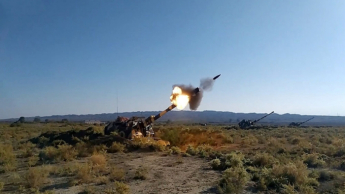Zhiqun Zhu: A conflict in the Taiwan Strait may serve as a trigger for a US-China war - İNTERVİEW

Interview with Professor Zhiqun Zhu, a distinguished scholar on Asian affairs at Bucknell University, USA.
Interview with Professor Zhiqun Zhu, a distinguished scholar on Asian affairs at Bucknell University, USA.
- US President Joe Biden invited PRC President Xi Jinping to meet in person during a recent telephone conversation, reported The Financial Times. However, the American side later called the newspaper’s message untrue. Why?
- The Financial Times’s report is based on unidentified sources who are supposed to be familiar with the Biden-Xi phone conversation, but it is hard to verify whether the report is true or not.
It is likely that President Biden mentioned the upcoming G20 summit in Rome, Italy on October 30-31, 2021 as a possible venue for such an in-person meeting. Biden apparently plans to attend the meeting, but Xi has not decided yet. In fact, Xi has not traveled abroad since the pandemic started. Given the global pandemic situation and general caution among Chinese leaders, it is unlikely that Xi will travel abroad this year. If that’s the case, Biden would be disappointed. Neither side wants to be perceived as one whose proposal was rejected by the other side. What is interesting is that China has kept silent on this topic, which adds to the mystery here.
- According to The Financial Times, President Biden hoped to "break the deadlock" in relations between the United States and China. However, President Xi insisted that Washington should change its confrontational approach toward Beijing. Why is the relationship between Washington and Beijing at an impasse?
The transition from Trump to Biden offered some hope that US-China relations might improve. So far that hope has proved to be wishful thinking. Biden has essentially carried on the Trump-era policies toward China. US Secretary of State Anthony Blinken defined the relationship as three Cs – competition, cooperation, and confrontation. During the Biden-Xi phone call, the two leaders agreed that they should prevent competition from veering into conflict, essentially redefining the bilateral relationship as “competition and cooperation.”
However, deep distrust remains and words and deeds do not match. For example, shortly after the Biden-Xi conversation, it was revealed, also by The Financial Times, that the United States is seriously considering changing the name of Taiwan’s office in Washington to official-sounding “Taiwan Representative Office.” further upgrading the US-Taiwan relationship, violating America’s own one-China policy. And the United States, United Kingdom and Australia suddenly announced the formation of a new nuclear pact AUKUS, ostensibly for maintaining security in the Indo-Pacific region, but everybody knows the real target is China. With such fundamental and structural problems between the two sides, it is very hard to break the impasse in the US-China relationship.
- How real is the threat of war between the United States and China? In which format - direct or hybrid?
- The possibility of a direct war between the United States and China is low but cannot be ruled out. The most likely scenario is a conflict in the Taiwan Strait, which will serve as a trigger for a US-China war.
The Chinese Dream of national rejuvenation includes unification with Taiwan. Yet, few people in Taiwan are interested in unification with China. On the contrary, with de-sinonization education, the majority of people in Taiwan today think they are just Taiwanese, not Chinese. It seems impossible to reconcile the two contradictory forces. The United States is not only obligated by its domestic law, the Taiwan Relations Act, to help defend Taiwan, but is also engaged in a global competition with China. A conflict in the Taiwan Strait will almost certainly lead to a direct military confrontation between the United States and China.
- General Mark Milley, Chairman of the Joint Chiefs of Staff under former US President Donald Trump, made two secret phone calls to his Chinese counterpart during the final months of the Trump presidency to prevent a war. This was reported by The Washington Post, citing a book by journalists Bob Woodward and Robert Costa. According to the report, General Milley was so concerned that an unstable Trump might start a war with China that he called his Chinese counterpart to reassure Beijing that there would be no war. How would you comment on this?
- General Milley said such calls were routine and were done to reassure both allies and adversaries in order to ensure strategic stability. I think General Milley acted professionally and his intention to avert a major global crisis is commendable.
This story tells us at least two things: Trump was completely unfit for leading the United States with an unstable state of mind, and the US military is fully aware of the grave consequences of starting a war with another nuclear power. Let’s hope that national leaders around the world will all be rational and will not resort to war to resolve international disputes.
- What could be the consequences of deteriorating relations between China and the United States for Central Asia and Russia? How does China see Russia's position in the confrontation between Beijing and Washington?
- One logical step for China to take is to boost relations with other countries, especially non-Western states, including Russia and Central Asian countries. Xi Jinping’s recent call for solidarity, upholding common security, openness and integration for the Shanghai Cooperation Organization is an example of such effort. In particular, China’s Belt and Road Initiative will be further expanded into Central Asia, and China-Russia political and diplomatic relations will become even stronger. In fact, President Putin became the first world leader who agreed to attend the 2022 Beijing Winter Olympics as a sign of support for China.
The United States has formed various security groups to counter China, such as the QUAD, the Five Eyes, and the AUKUS. China is expected to break such US-led coalitions by strengthening relations with Russia, some European countries, and the vast majority of developing nations. As the United States and China are moving in the opposite directions, the world faces the danger of slipping into two opposing camps, reminiscent of the Cold War. It is the responsibility of the two global powers to do more constructive things to promote peace and tackle common global challenges now such as the pandemic and climate change.
Interviewed by Seymur Mammadov
The Rocket and Artillery formations of the Azerbaijan Army conduct live-fire exercises in accordance with the combat training plan for 2021, the Ministry of Defense of Azerbaijan told Baku Tribune.
LAST NEWS






.jpg&h=67&w=67&zc=1&q=100)













